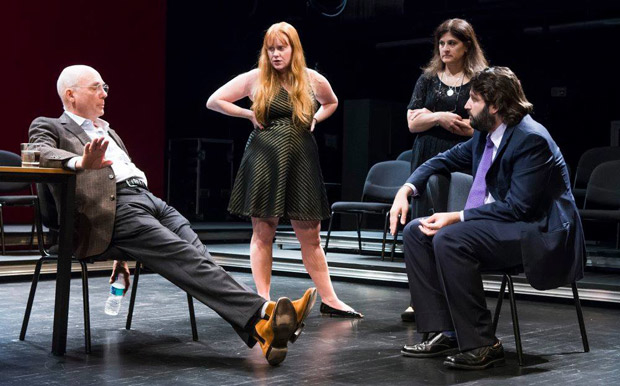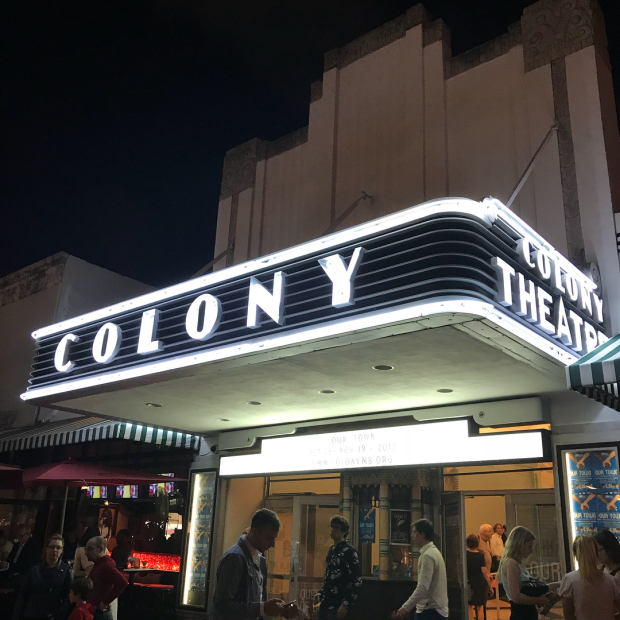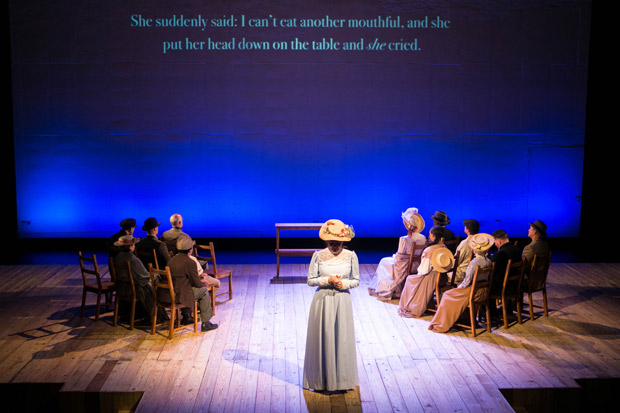How Do You Build a Regional Theater From the Ground Up? Michel Hausmann Has an Answer
Working with Moisés Kaufman and Lisa Dozier King, Hausmann’s Miami New Drama connects the dots between theater and community.
"If you're going to create a regional theater in the 21st century, what kind of work are you going to do?"
Artistic director Michel Hausmann and producing director Lisa Dozier King considered this question when, in September 2016, the city of Miami Beach voted unanimously to give their recently formed company, Miami New Drama, control of the historic Colony Theatre in South Beach. At the time, Miami New Drama had only produced one show, Hausmann's musical The Golem of Havana, but the work and its Cuban-Jewish influences struck a chord within the community, and the show sold out its entire extended six-week run.
While Miami Beach is the home of cultural and performing arts organizations like New World Symphony and Miami City Ballet, the presence of theater — especially theater that could bring together the area's diverse demographics — has been minimal since the closure of the famed Coconut Grove Playhouse in 2006. Enter Hausmann, a gregarious Venezuelan expat, and King, a New York transplant, who were looking to build a theatrical community in a city that didn't really have one.
"Miami is so different than the rest of Florida," says King, "and New Yorkers who have not spent time down there don't know that." It was also, as Hausmann points out, "the only metropolis in America without a nationally renowned regional theater."

(photo provided by Miami New Drama)
Back home in Venezuela, Hausmann was the cofounder and artistic director of the company Palo de Agua. "We were, most likely, the largest theater company in Venezuela," he says. "We did everything from big musicals to world premieres, and what I liked most was that I was in conversation with the community." When political response to their work turned violent (Hausmann's production of Jesus Christ Superstar was attacked with tear gas in retaliation for the company's going public with the terms of a financial sponsorship deal), Hausmann, with the support of his friend, colleague, and fellow Venezuelan theatermaker Moisés Kaufman, moved to New York City, got his M.F.A. at Columbia, and began directing at venues like Repertorio Español and Classic Stage Company.
While his career was taking off, it was "hard for me to imagine my future in New York," Hausmann confesses. "I wanted to have that thing I longed for, which is a relationship with a community."
In 2014, Hausmann went to Kaufman with a pitch. "Michel said he wanted to go to Miami to start a new theater company," Kaufman remembers. "Miami is a cultural capital of America that lacks that kind of regional theater." Kaufman was on board. Hausmann became the artistic director, relocating to Miami "without really knowing what was going to come of it." Kaufman took on the role of cofounder and artistic associate. After becoming fast friends with Hausmann, King, a veteran New York theatrical general manager who relocated to teach at the University of Miami, joined the organization as producing director.
With cultural ties to the Cuban and Jewish communities, The Golem of Havana, which premiered in 2013 at La MaMa and later played Barrington Stage, was the perfect show to launch the organization. For six weeks, they rented the Colony, originally an art deco movie palace that was being run by a for-profit company as a theater after a multimillion-dollar renovation. The risk paid off. Though they advertised the production in the local papers, it was word of mouth (combined with foot traffic from the Colony's very visible Lincoln Road location) that caused tickets to sell like hotcakes. "It sold out like no other show had ever sold out in Miami," Hausmann notes proudly.
"Michel is very ambitious in his artistic vision," adds King. "He said, 'We need to have a home,' and I said, 'Yes, in the 10-year plan, we need to find a home down here.' And he said, 'What about the one-year plan?'" Hausmann lobbied the City of Miami Beach for control of the theater. Miami New Drama took over the Colony, in partnership with the city, on October 1, 2016. Seven months later, Golem closed.

(© David Gordon)
The inaugural season included two other shows: the American premiere of Ferdinand von Schirach's courtroom drama Terror, directed by Gregory Mosher, and the Play Company and Por Piedad Teatro's A Special Day, based on the Italian film by Ettore Scola. But 2017-18 marks their first full season, and one that hews close to Hausmann's desired mission to "create new work that is as multicultural, multilingual, and diverse as the people in our community."
Onstage at the Colony through November 19 is Thornton Wilder's Our Town, a classic reinvented with the Miami audience in mind. Using translations by playwrights Nilo Cruz and Jeff Augustin, this production features a Webb family that speaks Spanish and a Gibbs family that speaks a mixture of English and Creole. "For Wilder," Hausmann explains, "this play was about what we all share as human beings. The idea of the play being translated into multiple languages at the same time is within his spirit. Our Town is not about small-town America; it's about what it means to be alive." Wilder's notoriously difficult-to-please estate has provided its enthusiastic support.
"What I love about the mission that Michel and Moisés developed together is that they're really standing by it," King explains. "The tapestry of culture in Miami is manifested on our stage, and that's really exciting to me." This diversity is also seen on the other side of the footlights; Our Town is attracting a younger, more diverse crowd than you are likely to see in New York, and that aspect is also a facet of the mission. "We need to get the youth in Miami coming to see theater — and excited about seeing their culture onstage."

(© Stian Roenning)
To further their mission, Miami New Drama is arranging student matinees with local public schools, and students from the theater department at the University of Miami, where King heads the B.F.A. theater management program, work at the Colony. King is hoping to develop a full-scale educational program modeled after the ones at not-for-profit organizations like Manhattan Theatre Club. Within the organization, she notes, they're "trying to create a culture that empowers and embraces artists of all levels in our company," whether the artist is a young actor working toward professional status or an usher trying to create a show independently.
Next up is a coproduction of Kristoffer Diaz's The Elaborate Entrance of Chad Deity, presented with Asolo Repertory Company. In April, Miami New Drama will showcase the world premiere of a work it commissioned, Hilary Bettis's Queen of Basel. A modern riff on August Strindberg's Miss Julie, the bilingual work is set during Miami's annual internationally renowned Art Basel festival. Like the concept for Our Town, this play will further explore the way language affects human dynamics. The characters John and Christine "speak Spanish among themselves," says Hausmann, "but when Julie comes in, they switch to English." The season concludes with The Album, a new work written and directed by Kaufman with his Tectonic Theater Project.
The long-term hope for the theater is that it will add Miami to the country's theater conversation. "Ten years down the line," Kaufman hopes, "I'd like Miami New Drama to be the Goodman Theatre of Florida." With a laugh, he changes his mind. "I want that in, maybe, five years."
As Hausmann sees it, "Miami is at an advantage: We're much more diverse than what America is right now, but America is going in that direction. The work that we're able to do today is going to inform the work that the rest of the country will do in 20 years or so. I'm less interested in going to New York, seeing what shows are good, and doing them here," he concludes. "I'm much more interested in having New York come to Miami and see what we're doing."







